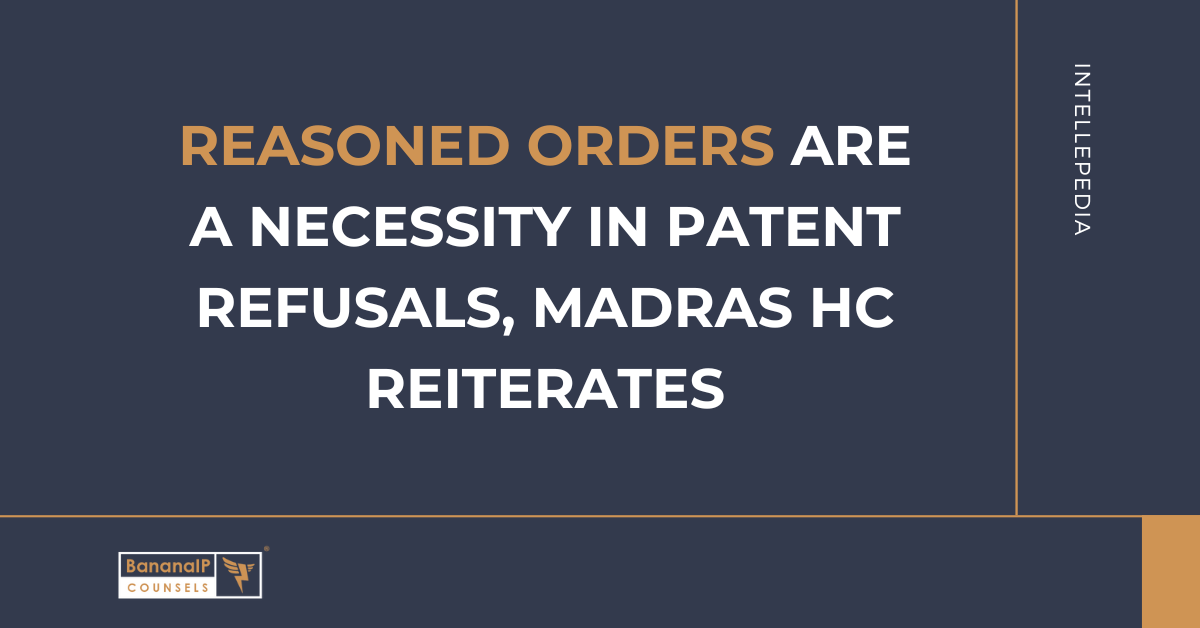Delhi HC revives Trident’s patent application, citing flaws in the inventive step analysis of its air-rich yarn invention.
Read more about Inventive Step Misjudged? Delhi HC Revives Trident’s Patent ApplicationTag: Patent Refusal
Patent Refusal Cannot Be a Single Line: Calcutta High Court Calls for Reasoned Orders
In the case of Stromag GmbH vs. Controller General of Patents, the Calcutta High Court ruled that patent refusal orders must contain detailed reasoning. A single-line dismissal, the court said, does not meet the legal standards of a quasi-judicial function and is unsustainable.
Read more about Patent Refusal Cannot Be a Single Line: Calcutta High Court Calls for Reasoned OrdersZiegler-Natta Catalyst Patent Rejection Upheld for Lack of Inventive Step
The Delhi High Court upheld the refusal of Lummus Novolen’s patent for a Ziegler-Natta catalyst, citing lack of inventive step and similarity to prior art. Read the key observations and legal reasoning.
Read more about Ziegler-Natta Catalyst Patent Rejection Upheld for Lack of Inventive StepBlackberry’s Patent Refusal Set Aside by Delhi High Court
The Delhi High Court has set aside the Indian Patent Office’s refusal of Blackberry’s communication patent application. Citing a lack of reasoning and violation of natural justice principles, the Court directed a fresh evaluation of the amendments and remaining objections under the Patents Act.
Read more about Blackberry’s Patent Refusal Set Aside by Delhi High CourtReasoned orders are a necessity in patent refusals, Madras HC reiterates
 Featured image for article: Reasoned orders are a necessity in patent refusals, Madras HC reiterates
Featured image for article: Reasoned orders are a necessity in patent refusals, Madras HC reiterates
The Madras High Court overturned a patent refusal in Signal Pharmaceuticals vs. Deputy Controller of Patents, citing a lack of reasoning in the rejection order. The Court observed that the Patent Office failed to address the applicant’s arguments, disregarded amended claims, and provided no justification for the refusal under Section 2(1)(ja) and Section 3(d) of the Patents Act. The case was remanded for reconsideration, reinforcing the necessity of well-reasoned patent orders.
Read more about Reasoned orders are a necessity in patent refusals, Madras HC reiteratesMadras High Court Overturns Patent Refusal under section 3(d), Reiterates Importance of Reasoned Orders and Natural Justice
The Madras High Court set aside a patent refusal under section 3d, citing lack of procedural fairness and insufficient reasoning. The Court directed reconsideration, underscoring the necessity of reasoned orders and respect for principles of natural justice in patent proceedings.
Read more about Madras High Court Overturns Patent Refusal under section 3(d), Reiterates Importance of Reasoned Orders and Natural JusticeSection 3(j), Essentially biological processes and human intervention
The Madras High Court considered whether human intervention in a plant breeding method excluded it from section 3(j) of the Patents Act. The case was remanded to the Patent Office, underlining the importance of clear reasoning in patent refusals involving essentially biological processes.
Read more about Section 3(j), Essentially biological processes and human interventionA doped order on method of doping, court clarifies
The Madras High Court upheld the Patent Office’s refusal of IIT Madras’s patent application for a method of doping potassium into ammonium perchlorate. The judgment clarifies the application of Section 3d and inventive step requirements in Indian patent law.
Read more about A doped order on method of doping, court clarifiesGreen Cross Crosses court’s bridge to win appeal
The Madras High Court set aside the patent refusal order against Green Cross, highlighting errors in the assessment of inventive step and technical disclosure. The case has been remanded for fresh examination within four months, with directions to provide a hearing to Green Cross.
Read more about Green Cross Crosses court’s bridge to win appealCourt balances Hygieia’s patent application after IPO disbalances it under section 59
The Madras High Court set aside the refusal of Hygieia’s patent application, stressing the importance of considering amended claims with the original specification. The case provides key guidance on section 59 and claim amendments under Indian patent law.
Read more about Court balances Hygieia’s patent application after IPO disbalances it under section 59


